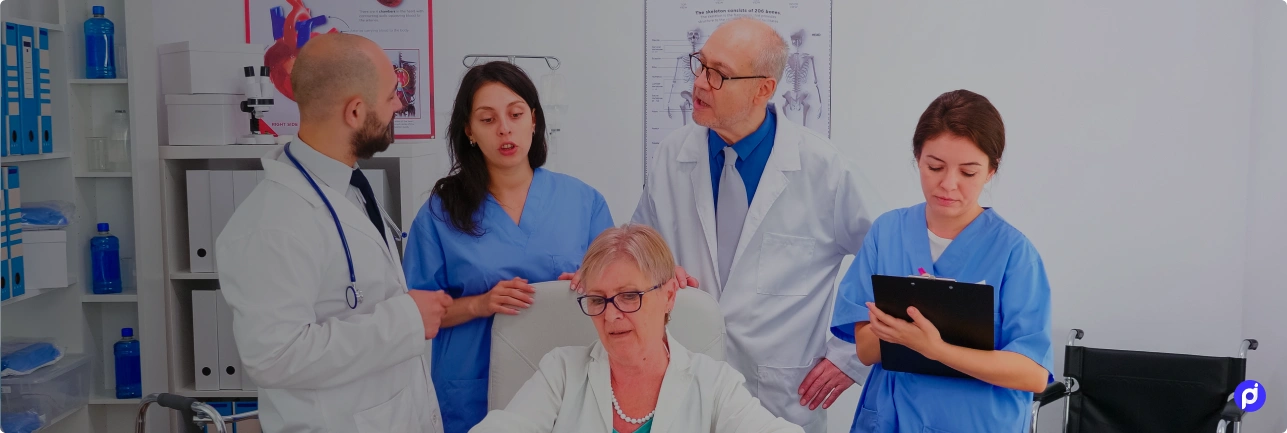Artificial Intelligence Reorganizing Healthcare: Current and Future Prospects
Posted By - Pony

Posted On - May 3, 2024

Artificial Intelligence has created a turmoil across industries. In the healthcare industry, operations are reorganized with AI technologies. The presence of Artificial Intelligence in healthcare has given a boost to diagnostics, treatment quality and engagement with health care service users. Artificial Intelligence has revolutionized the entire health care industry benefiting both service users and service providers. Let’s look at the prospects of AI in healthcare.
Current Prospects of AI:
1. Accuracy in Diagnosis
If you start talking about AI, you cannot ignore its diagnostic accuracy. AI can examine large data to enhance Diagonostic precision. Machine Learning algorithms created by expert Machine Learning Development Services providers can detect the odds in detail about a healthcare service user resulting in more accurate detection of life-threatening disorders like cardiac disorder, cancer and other chronic illness.
2. Making Medical Professionals’ Role Easy
AI does not replace any medical professional but with the use of Artificial Intelligence doctors’ responsibilities become much simpler. Besides, AI streamlines all other managerial activities. This allows medical professionals to dedicate their time to delivering tailored patient care and tackling intricate decision-making.
Furthermore, AI can examine patient information to propose customized treatment strategies tailored to each person’s medical background, genetic makeup, and responses to treatment. By forecasting the efficacy of various therapies, AI reduces reliance on trial-and-error methods, resulting in more precise and effective treatments.
3. Disease Management
Chronic illness needs better management. When wearables and mobile applications are embedded with AI, patient health can be tracked with real time data. Such data evaluated by Artificial Intelligence algorithms can generate alerts before a disorder becomes serious, reducing the risk of occurrence of a critical situation. For instance, AI powered apps can detect blood sugar and activity levels helping patients to get a diet suggestion and recovery strategy.
4. Drug Discovery
Artificial intelligence speeds up the process of discovering new drugs by examining extensive scientific information to find possible drug targets and forecast the efficacy and safety of novel compounds. Through analyzing intricate molecular formations, AI algorithms detect undiscovered drug targets, thereby facilitating the creation of more precise and efficient therapies.
Prospects of AI in Future:
AI in health care will bring a brighter future. These advancements are only the start of AI’s influence. In future AI will bring more advancements across different aspects like robotic surgery, virtual assistants etc. As AI-powered genomics are making grounds, the prospect of bespoke medical care designed around an individual’s genetic blueprint is on the horizon. With advancements in AI, its effortless inclusion in healthcare holds the potential for swifter and more precise diagnoses, customized treatment strategies, and proactive health maintenance for patients.
Winding Up
As AI revolutionizes healthcare, medical treatment and diagnosis of diseases will see a positive turn towards advancement. This shift promises swifter diagnoses, personalized treatments, and proactive health management. With the help of an AI/ML Development Services Company, healthcare can seamlessly integrate machine learning into practice, ensuring precision and efficiency. The synergy between AI and genomics heralds a future where healthcare is truly personalized, transforming patient outcomes and paving the way for a new era of proactive health maintenance.
Reference: Artificial Intelligence (AI) revolutionizing healthcare: A look at the present and future! (dsij.in).
FAQs:
FAQ 1. How does AI improve diagnostic accuracy in healthcare?
AI analyzes large datasets to enhance diagnostic precision, detecting nuances that may be missed by human practitioners. Machine learning algorithms developed by expert providers can identify patterns indicative of life-threatening disorders like cardiac issues or cancer, leading to more accurate diagnoses.
FAQ 2. Does AI replace the role of medical professionals?
No, AI complements the work of medical professionals by streamlining administrative tasks and providing valuable insights. It allows doctors to focus more on delivering personalized patient care and complex decision-making, ultimately making their roles easier and more efficient.
FAQ 3. How does AI contribute to disease management for chronic illnesses?
AI, when integrated with wearables and mobile applications, tracks patient health in real-time. By analyzing this data, AI algorithms can generate alerts before a condition escalates, reducing the risk of critical situations. For example, AI-powered apps can monitor blood sugar levels and activity levels, providing personalized diet suggestions and recovery strategies.
FAQ 4. What role does AI play in drug discovery?
AI accelerates drug discovery by analyzing vast amounts of scientific data to identify potential drug targets and predict the efficacy and safety of novel compounds. By analyzing complex molecular structures, AI algorithms can uncover undiscovered drug targets, facilitating the development of more precise and efficient therapies.
FAQ 5. What are the prospects of AI in healthcare?
The future of AI in healthcare holds promise for advancements in robotic surgery, virtual assistants, and personalized medicine based on individual genetic profiles. As AI-powered genomics continues to advance, bespoke medical care tailored to each person’s genetic blueprint is on the horizon. With ongoing advancements, AI will enable swifter and more precise diagnoses, customized treatment strategies, and proactive health maintenance for patients.












